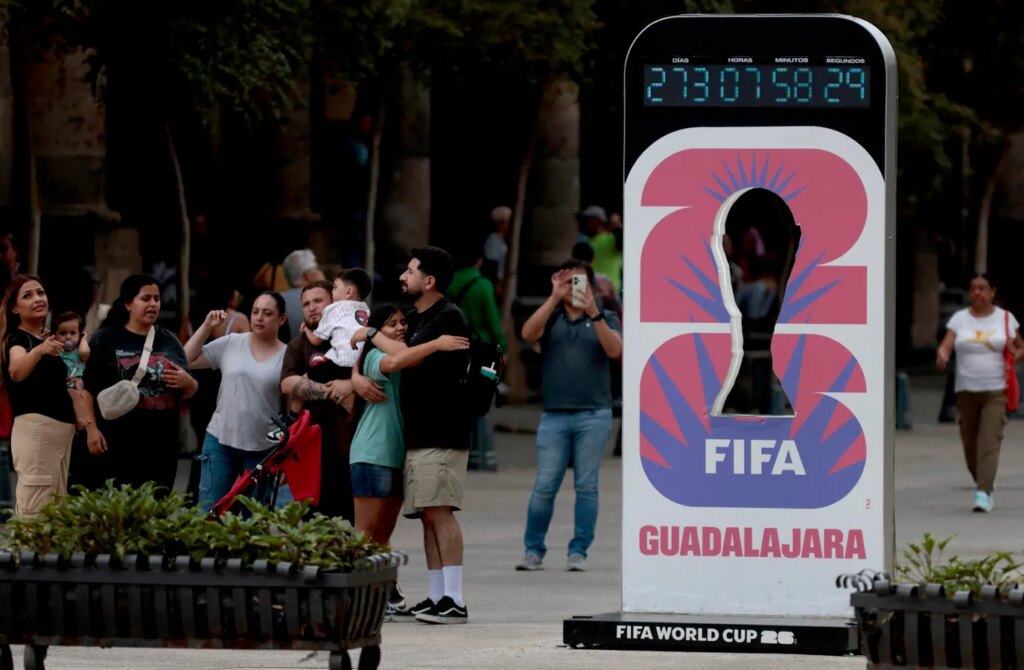FIFA World Cup 2026 countdown clock in Guadalajara, Jalisco state, Mexico on September 10.
AFP via Getty Images
Everywhere you turn, there’s another sign that 2026 World Cup tickets will be close to impossible for average fansn to acquire.
The first of several waves of a ticket lottery process led to 4.5 million applicants and far fewer selected to actually purchase tickets later this month.
Then there were ticket postings on established resale sites for exhorbitant prices, even though the sellers likely don’t even have possession of the tickets they are offering.
If you can get past the frenzy, though, what may actually be happening is a speculative rush that isn’t truly based on how many fans will actually be willing and able to attend all 104 tournament matches in the United States, Canada and Mexico.
Here’s three reasons world Cup tickets demand may actually be artificially inflated.
Flawed Assumptions Based On 1994
The 1994 FIFA World Cup – also hosted in the United States – still stands alone as the most attended World Cup in history. It came at a time when soccer was far less established as a spectator sport in the United States. And it has become the baseline for expectations on turnout for the 2026 event.
The assumption is that if 1994 was so successful among a populous with relatively little soccer knowledge, then a far more educated 2026 North American fanbase should blow those totals out of the water.
But that educated fanbase can cut both ways. In 1994, it was easy to sell the novelty of group stage matches between relatively unheralded teams like South Korea, Saudi Arabia, Bolivia and Morocco. There was almost no big time soccer available on live TV at the time. The American public barely knew more about the Brazil and Italy sides that reached the final than it did about those upstart nations.
In 2026, Americans can watch hundreds of matches from the English Premier League, La Liga, UEFA Champions League and more from the comfort of their living rooms. The idea that those fans will willfully spend hundreds of dollars to watch two unfamiliar teams is questionable, especially when they might also be planning to spend money to see their favorite club teams on a preseason USA tour later that summer.
The early rush to purchase World Cup tickets almost certainly isn’t taking this economic tension into account. But it will become clearer as the event approaches.
FIFA Pushing Resale For Profit
For the first time at a World Cup, FIFA has pledged to create an official ticket resale platform that will not set a limit on the price sellers can ask of buyers.
In the process, it is harnessing this assumption of extremely high demand and repositioning tickets not just as passes to an event, but as commodities to invest in.
There’s zero doubt many of those who have registered to try and buy match tickets will be doing so with an eye toward reselling at least some of those tickets at a profit. If you believe the general consensus that demand will only increase as the tournament nears, you’d almost be foolish not to take this approach if you were permitted into FIFA’s ticket purchasing platform early on in the process.
But if a large portion of buyers are purchasing tickets for that reason, that would lead to tickets being purchased at a far higher rate than actual interest in attending the matches. And if that happens, instead of those buyers recouping their investment multiple fold, there’s the possibility they end up having to drop their asking price below face value for matches involving less notable teams or at harder travel destinations.
That result might be embarassing for FIFA but likely wouldn’t hurt its bottom line, since it’s the early buyers who would be eating the cost financially.
48 Teams Means A Lot More Minnows
The makeup of the 2026 World Cup field will be considerably different than any previous edition because of the expansion to a 48-team field.
And of the 16 additional berths, only five are allocated to Europe (UEFA) and South America (CONMEBOL), meaning the remaining 11 could come from confederations that are much less familiar to fans.
Uzbekistan and Jordan have already sealed qualification for their first-ever World Cups. Cape Verde is also on the verge of sealing its place for the first time, and Benin also has a strong shot to be a first-time qualifier.
While those are lovely stories, they aren’t going to be the kinds of teams who can sell out NFL-sized stadiums at more-than-NFL prices.
This explains why FIFA is staging the first two waves of ticket sales before the draw this December that will determine the full match schedule. In many cases, the value of tickets could go down once fixtures are solifidied, particularly if the matches don’t involve a traditional power or a nation with a large local expatriot community.

